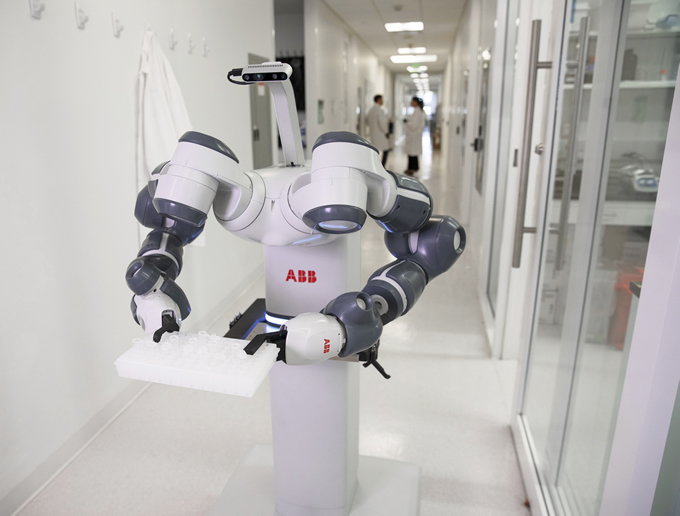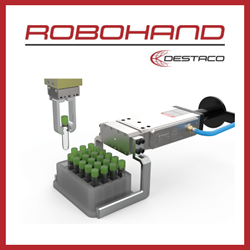ABB demonstrates concept of mobile laboratory robot for Hospital of the Future

ABB today opened its first global healthcare research hub on the Texas Medical Center (TMC) campus, in Houston, Texas – showcasing a number of concept technologies, including a mobile YuMi robot, which will be designed to assist medical and laboratory staff with laboratory and logistics tasks in hospitals.
The dual-arm mobile YuMi will be able to sense and navigate its way around its human co-workers autonomously, while learning to find different routes from one location to another. It has the potential to undertake a wide range of repetitive and time-consuming activities, including preparation of medicines, loading and unloading centrifuges, pipetting and handling liquids and picking up and sorting test tubes.
The mobile YuMi could also be used in hospitals for a wide variety of logistics roles. YuMi may be able to dispense medicines, transport them to where they are needed in hospitals, and bring medical supplies to hospital staff and bed linen direct to patients’ bedrooms.
At TMC Innovation Institute, ABB will develop robots that are able to carry out repetitive, delicate and mundane processes, leaving highly skilled medical and laboratory staff free to undertake more valuable roles and ultimately treat more patients. ABB analysis shows that repetitive tasks could be completed up to 50 per cent faster with automation, compared to current manual processes, with the added benefit that robots can work 24 hours a day.
“The healthcare sector is undergoing significant transformation as the diagnosis and treatment of disease advances, while coping with an aging population, increasing costs and a growing worldwide shortage of medical staff. With our new healthcare research and development hub at TMC we are aiming to develop answers to these challenges – together with the best minds in academia, science and medicine,” said Sami Atiya, President of ABB’s Robotics and Discrete Automation business. “Our experience in industrial and collaborative robotics will give us a strong basis to be able to adapt flexible automation to the healthcare sector. Together with our partners at TMC, we will develop cutting-edge robotics solutions. We are working to reduce the number of manual procedures performed by medical staff, improve the accuracy of laboratory work and enhance patient satisfaction and ultimately patient safety.”
Other technologies showcased by ABB at the Healthcare Research Hub include YuMi robots that could aid in centrifuge tending and test tube handling systems, and an IRB 1200 robot that could execute liquid transfers in a pipetting application. All are common medical laboratory tasks that robotic automation may be able to support by combining consistent performance with a level of flexibility and continuous operation that could increase throughput and quality while minimizing costs.
TMC is the largest medical city in the world with world-class collaborative research resources, including some of the world’s leading companies and hospitals. ABB’s new 5,300 sq ft (500m2) Healthcare Hub will be housed at the TMC Innovation Institute, a state-of-the-art hub that fosters collaboration of medicine and cutting-edge technology, connecting start-ups with pioneers in academia and leading technology companies in order to accelerate the development and prototyping of breakthrough medical technology.
“Texas Medical Center, TMC Innovation, and the entire TMC network of member institutions are pleased to welcome ABB on the occasion of its first foray into the healthcare space with this incredible and unprecedented new robotics facility,” emphasized Bill McKeon, President & CEO of Texas Medical Center. He added, “A primary goal across TMC – the largest medical city in the world – is to make research happen faster while simultaneously cutting costs in order to create more rapid and cost-effective solutions for patients who are in desperate need of treatment. ABB’s move into the heart of the Texas Medical Center campus with this first-of-its-kind R&D facility for creating robotics solutions in healthcare will set a new course for advancements in medicine and establish TMC as the nexus for a new kind of synergistic partnership that will shape the future of healthcare for clinicians, researchers, and patients alike.”
Robotic automation in the healthcare sector offers significant opportunity for future growth. According to internal ABB research, the global market is estimated to reach nearly 60,000 non-surgical medical robots by 2025, a fourfold increase from 2018.
##
ABB (ABB: NYSE) is a technology leader that is driving the digital transformation of industries. With a history of innovation spanning more than 130 years, ABB has four customer-focused, globally leading businesses: Electrification, Industrial Automation, Motion, and Robotics & Discrete Automation, supported by the ABB Ability™ digital platform. ABB’s Power Grids business will be divested to Hitachi in 2020. ABB operates in more than 100 countries with about 147,000 employees. www.abb.com
ABB Robotics is a pioneer in industrial and collaborative robots and advanced digital services. As one of the world’s leading robotics suppliers, we are active in 53 countries and over 100 locations and have shipped over 400,000 robot solutions for a diverse range of industries and applications. We help our customers to improve flexibility, efficiency, safety and reliability, while moving towards the connected and collaborative factory of the future. www.abb.com/robotics
ABOUT TMC INNOVATION
Texas Medical Center (TMC)—the largest medical city in the world—is at the forefront of advancing life sciences. Home to the brightest minds in medicine, TMC nurtures cross-institutional collaboration, creativity, and innovation among its 106,000-plus employees. With a campus of more than 50 million square feet, TMC annually hosts 10 million patients, performs over 180,000 surgeries, conducts over 750,000 ER visits, performs close to 14,000 heart surgeries, and delivers over 25,000 babies. Beyond patient care, TMC is pushing the boundaries of clinical research across its extensive network of partner institutions on a daily basis, pioneering effective health policy solutions to address the complex health care issues of today, and cultivating cutting-edge digital health applications and medical devices. For more information, please visit www.tmc.edu.
Featured Product

